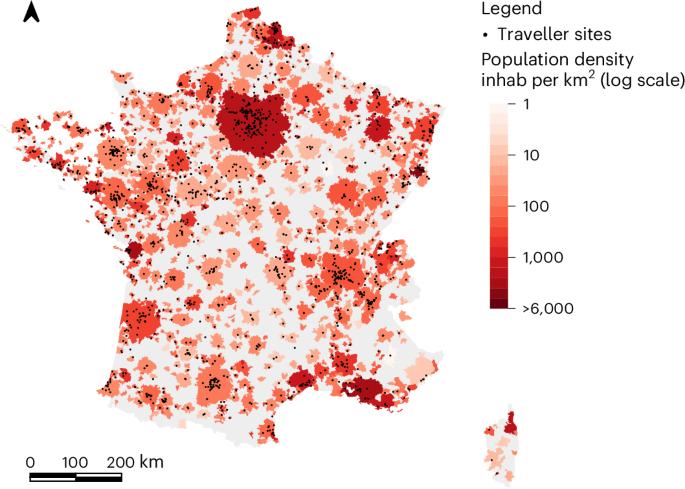Urban planning decisions expose Traveller sites to disproportionate environmental burdens
引用次数: 0
Abstract
Ethnic minorities often face environmental inequalities, as they are more likely to be exposed to hazardous and polluting facilities. Yet the role of urban planning on shaping these inequalities, particularly in Europe, remains understudied. The siting of Traveller sites offers a clear example of how repeated urban planning decisions can produce systemic discrimination, as local representatives determine where Travellers are allowed to stay, thereby directly influencing their exposure to environmental disamenities. Here by linking Traveller sites in France with socioeconomic and environmental data, we provide statistical evidence that Traveller sites are more likely to be implemented in cities with more disamenities and that sites are more exposed than any other residential areas within these cities (even other disadvantaged households). On the basis of our findings, we discuss two potential mechanisms that may underpin this discrimination: cost minimization and discriminatory preferences of local representatives and residents. The Travellers case illustrates the need for more thorough examinations of how urban planning decisions contribute to socio-spatial inequalities, particularly in the European context. French planning decisions systematically locate Traveller sites near environmental disamenities. This study reveals disproportionate exposure to waste facilities and highways compared to other residential areas.

城市规划决策使游民场所面临不成比例的环境负担
少数民族往往面临环境不平等,因为他们更有可能接触到危险和污染的设施。然而,城市规划在形成这些不平等方面的作用,特别是在欧洲,仍未得到充分研究。“旅行者”住宿点的选址清楚地表明,重复的城市规划决定如何产生系统性歧视,因为地方代表决定“旅行者”的住宿地点,从而直接影响他们对环境不利因素的暴露。通过将法国的“旅行者”站点与社会经济和环境数据联系起来,我们提供了统计证据,表明“旅行者”站点更有可能在更不舒适的城市中实施,并且与这些城市中的任何其他居民区(甚至其他弱势家庭)相比,这些站点的暴露程度更高。基于我们的研究结果,我们讨论了可能支持这种歧视的两种潜在机制:成本最小化和地方代表和居民的歧视性偏好。旅行者的案例说明,需要更彻底地检查城市规划决策如何导致社会空间不平等,特别是在欧洲背景下。法国的规划决策系统地将旅行者的地点定位在环境不利的地方。这项研究表明,与其他居民区相比,该地区对废物处理设施和高速公路的暴露程度不成比例。
本文章由计算机程序翻译,如有差异,请以英文原文为准。
求助全文
约1分钟内获得全文
求助全文

 求助内容:
求助内容: 应助结果提醒方式:
应助结果提醒方式:


